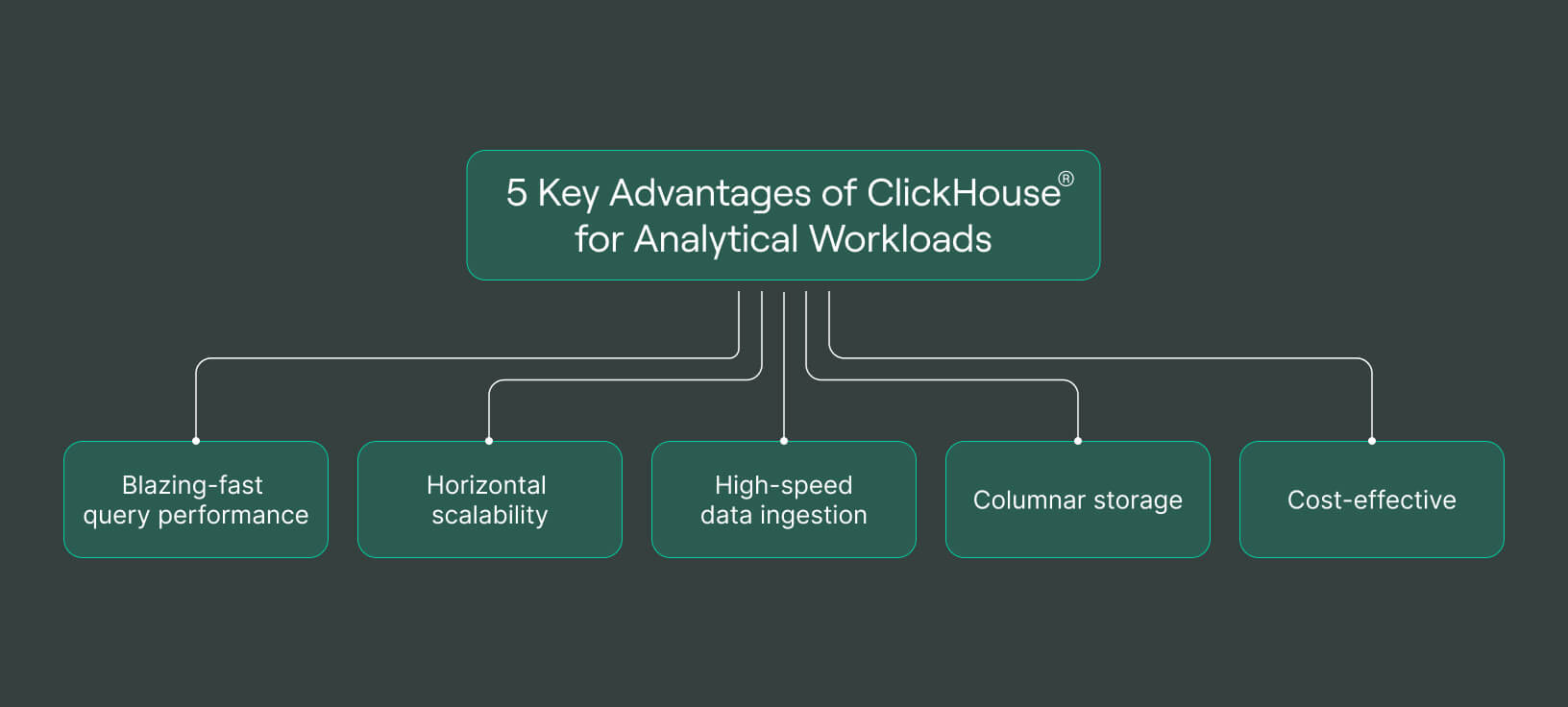
ClickHouse vs PostgreSQL: Choosing the right database for your analytical workload
When it comes to having the right database for analytical workloads, two popular options that often come up in discussions are ClickHouse and PostgreSQL. Both databases have weaknesses and strengths, and understanding their features, performance, and use cases can help you make an informed decision.
ClickHouse and PostgreSQL are two popular databases used for analytical workloads. In this article, we will compare the key features of ClickHouse and PostgreSQL and discuss why ClickHouse may be a better choice for your analytical workloads.
What are ClickHouse and PostgreSQL?
ClickHouse is an open-source columnar database management system developed by Yandex, designed for fast and efficient analytics on large datasets. Due to its asynchronous data modification, it is known for its high performance and ability to atomically update multiple tables, table engine, and process large amounts of data for continuous archiving at lightning-fast speeds.
PostgreSQL, or Postgres, is an open-source relational database management system widely used for various data management tasks, including analytical workloads. Being a support to materialized view, this enables Postgresql to be known for its robustness, extensibility, and versatility. Exporting data with data recovery struggles with this.
ClickHouse vs PostgresSQL: Comparison table
|
Difference |
ClickHouse |
PostgreSQL |
|
Licence |
Apache License 2.0 |
PostgreSQL License |
|
Open-source |
Yes |
Yes |
|
Architecture & Design |
Columnar Storage, Distributed processing |
Row oriented Storage, Client-Server Model |
|
Analytical Workloads |
Built for Analytical Workloads |
Suitable for OLTP and OLAP Workloads |
|
Performance |
High query performance, optimized for OLAP |
Balanced performance for OLTP and OLAP databases |
|
Scalability |
Horizontally scalable, handles big data |
Vertically scalable, suited for smaller databases |
|
Data Consistency |
Eventually consistent |
ACID compliant, strong data consistency |
|
Support |
Community-driven support |
Enterprise and community support |
|
Availability & Maintenance |
Frequent updates, active community |
Frequent updates, active community |
|
Use Cases |
Data Warehousing, Real-time Analytics |
General-purpose Database Management |
|
Cost |
Free and open-source |
Free and open-source, enterprise options available |
|
Data Partitioning |
Supports automatic data partitioning |
Supports manual data partitioning |
|
Replication |
Built-in support for replication |
Supports streaming replication for high availability |
|
Data Ingestion |
High-speed data ingestion |
Supports data ingestion through various methods |
|
Backup & Restore |
Supports consistent backup and restore |
Supports backup and restore mechanisms |
|
JSON Support |
Native support for JSON data |
Supports JSON data with query type support |
|
Speed |
Optimized for fast data processing |
Balanced insert performance and speed for OLTP databases and OLAP workloads |
|
Query Performance |
Blazing-fast query performance |
High-performance query execution |
|
Data Types |
Supports various data types |
Rich data type support |
|
Secondary Indexes |
Supports all kinds of indexes, including primary index and secondary indexes |
Supports secondary indexes for performance optimization |
|
In-memory Capabilities |
Supports in-memory storage |
Supports in-memory storage for faster query execution |
|
Community |
Active and growing community |
Active and established community and supports transaction. |
|
Installation |
Easy installation and setup |
Easy installation and setup |
What you should think about when choosing the right database
When choosing the right database for analytical workloads, there are several factors to consider. Comparing ClickHouse to PostgreSQL, the primary key is to evaluate the scalability and performance of the database, as well as its ability to handle large datasets and high-speed data ingestion. It’s also important to consider the database’s licensing, cost, and support options.
Here are some points to remember:
Data size and complexity: If you are dealing with large data volumes with complex relationships, ClickHouse’s columnar storage and parallel processing capabilities may provide better performance and scalability.
Query complexity: If your analytical queries are complex and require processing large amounts of data in parallel, ClickHouse’s optimized query performance and parallel processing capabilities may provide better performance.
Scalability: ClickHouse offers horizontal scalability with benchmark results, allowing you to add more nodes to the cluster as your data grows, ensuring seamless scalability as your analytical workload increases.
Data ingestion: ClickHouse is designed for high-speed data ingestion, making it suitable for use cases that require real-time analytics or data processing.
Extensibility: While PostgreSQL has a rich ecosystem of extensions, ClickHouse’s extensibility may have the same limitation. If you require specialized functionalities, PostgreSQL may be a better choice.

5 Key advantages of ClickHouse for analytical workloads
ClickHouse, with its user-defined functions, offers several key advantages for analytical workloads:
Blazing-fast query performance: ClickHouse is optimized for fast query performance, making it ideal for use cases where query speed is critical. Continuous aggregates can process large amounts of data at lightning-fast query speed, allowing for real-time or near-real-time analytics.
Horizontal scalability: ClickHouse offers horizontal scalability, allowing you to add more nodes to the cluster as your data grows, ensuring seamless scalability as your analytical workload increases regarding time-series data. However, TimescaleDB compression, when turned on, outperforms ClickHouse.
High-speed data ingestion: ClickHouse is designed for high-speed data ingestion, making it suitable for use cases that require real-time analytics or data processing. It can efficiently handle data streaming and real-time data ingestion, allowing for the timely analysis of large datasets.
Columnar storage: ClickHouse creates a columnar storage model, providing efficient uncompressed data and data encoding, reducing storage requirements, and improving query performance.
Cost-effective: ClickHouse is open-source software, which means it is free to use and requires no licensing fees. This makes it a cost-effective choice for specific workloads, especially small and medium-sized businesses.
How DoubleCloud helps you with ClickHouse?
DoubleCloud is a platform that offers rigorously tested tools and services to help businesses effectively leverage ClickHouse as a service for their analytical workloads. Here are some ways DoubleCloud can assist you with ClickHouse:
ClickHouse deployment and management: DoubleCloud provides easy deployment and management of ClickHouse clusters with cloud storage, allowing businesses to set up and manage their analytical databases efficiently. With automated provisioning, monitoring, and log management tools, DoubleCloud simplifies deploying and managing ClickHouse clusters, saving time and effort.
Performance optimization: DoubleCloud offers performance optimization services for ClickHouse, helping businesses fine-tune their ClickHouse clusters for optimal query performance. Through careful configuration and tuning, DoubleCloud can help businesses by ensuring that analytical queries are processed efficiently and promptly.
Data integration: DoubleCloud provides seamless data integration services, allowing businesses to ingest data from various sources into ClickHouse for analysis easily. Whether it’s data streaming, batch data ingestion, or data integration from external sources, DoubleCloud can help with smooth data integration processes.
Consulting and expertise: DoubleCloud offers consulting services and expertise in ClickHouse, including Clickhouse architecture design, performance tuning, and optimization. Their team of experienced professionals can provide guidance and best practices for leveraging ClickHouse to its full potential.
Custom solutions: DoubleCloud can develop custom database solutions tailored to your specific use case or requirements, such as data ingestion pipelines, data modeling, and analytics applications using ClickHouse. They can help you design, develop, and implement ClickHouse-based solutions that meet your business needs.
Monitoring and alerting: DoubleCloud offers comprehensive monitoring and alerting services for ClickHouse clusters, providing real-time insights into the health and performance of the databases. With proactive monitoring and alerting, businesses can quickly identify and resolve issues, ensuring the high availability and performance of their ClickHouse clusters.
Security and compliance: DoubleCloud helps companies to ensure the safety and compliance of their ClickHouse clusters through robust security features, including authentication, encryption, and access controls. With advanced security measures, DoubleCloud helps businesses protect their data and comply with industry regulations.
Final words
Choosing the right database for your analytical workloads is crucial for achieving optimal performance and scalability. ClickHouse offers several advantages over PostgreSQL, including blazing-fast query performance, horizontal scalability, high-speed data ingestion, columnar storage, and cost-effectiveness. With the help of DoubleCloud’s tools and services, businesses can effectively leverage ClickHouse for their analytical workloads, ensuring efficient data processing, performance optimization, data integration, monitoring, and security.

DoubleCloud Managed Service for ClickHouse®
An open-source, managed ClickHouse DBMS service for sub-second analytics.
Frequently asked questions (FAQ)
Is ClickHouse faster than Postgres?
Is ClickHouse faster than Postgres?
Yes, ClickHouse is known for its high performance and is optimized for fast data processing, particularly for analytical workloads. It uses columnar storage, distributed processing, and in-memory capabilities, which make it well-suited for handling large datasets and complex queries.
Conversely, Postgres is a general-purpose database management system that is balanced in terms of performance for both online transactional processing (OLTP) and online analytical processing, OLAP workloads.
What is ClickHouse good for?
What is ClickHouse good for?
What are the cost considerations for using ClickHouse vs PostgreSQL?
What are the cost considerations for using ClickHouse vs PostgreSQL?
How do ClickHouse and PostgreSQL scale to handle large datasets and high-speed data ingestion?
How do ClickHouse and PostgreSQL scale to handle large datasets and high-speed data ingestion?
Start your trial today



